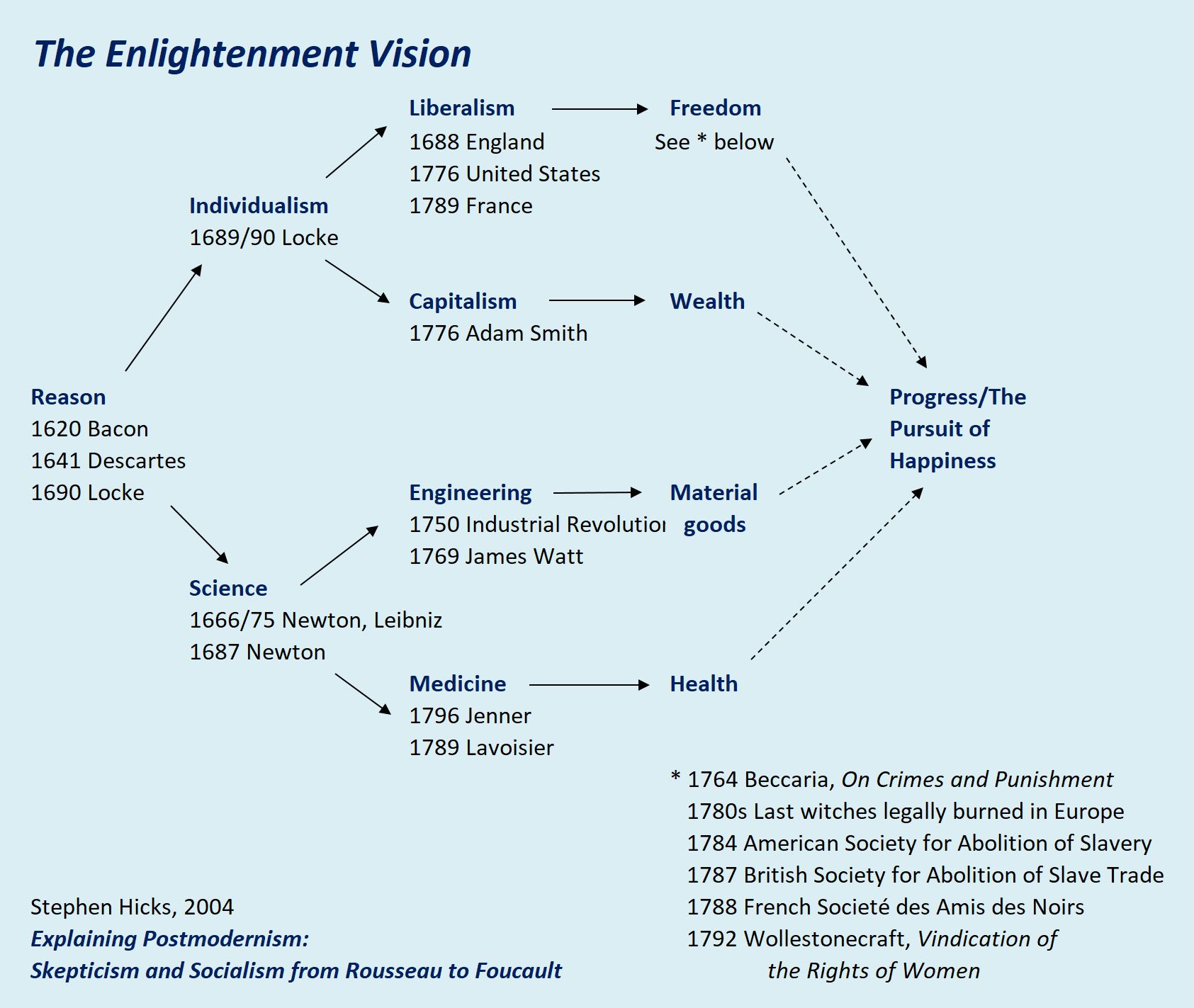The Enlightenment of the long 18th century was an era of awesome intellectual and cultural transformation.

This Enlightenment Vision flowchart is pitched at a high level of abstraction, showing schematically how the philosophical revolution of the 17th century led to the 18th-century revolutions in science, technology, politics, and economics — which in turn led to the dramatic increases in health, wealth, freedom, and goods in the 19th century.
To put it another way, the chronology shows how the ideas played out as philosophy, then as an intellectual movement, then as activism, then as the working technology of culture.
I first developed the chart for my courses and published a version of it in Explaining Postmodernism. It’s also here as an Excel file, in case you’d like to adapt it for your own purposes.
This is a perfect way of synthesizing the history of rational philosophy. Too bad the brain dead OWS protestors wouldn’t have a clue what this poster means. Since logic has been educated OUT of them.
Thanks, Scherie.
Dear Doctor Hicks:
Thank you for your DVD on “Nietzsche and the Nazis”. It is a first rate analysis. Your clear thinking is a wonder to behold.
I am attempting to write about how America is being seduced by the failed philosophies of Europe. Although rather old, 78, I am trying to put something together for the American people so that they might value what we have and inform them of the importance of their political choices.”
Great line “Since logic has been educated OUT of them”:
Keep up your great work.
Dear Ron: Thank you for you positive comments on “Nietzsche and the Nazs.” I appreciate them. All the best for your project.
Nice. Made me come up with a couple of wishes:
1. Perhaps a post-enlightenment section afterwards, esp. re economics & liberty: Hegel, Marx, Campbell, Russell, et al.
2. Make it 3D with some theological/ethical relationships, Luther, Calvin, Schleiermacher, Ritschl influences.
Let’s see now. You’ve backdated the Enlightenment to the 1600s. Pretending that the scientific revolution (which in fact began earlier — see, Copernicus, 1473 – 1543) is the same as the Enlightenment.
Your chart also suggests the Americans were ahead of the British with respect to opposition to slavery. Please look up Somerset vs Stewart. Or even crack open a history book.
The Enlightenment is a fraud. Always was. Modern medicine and technology owes nothing to the Enlightenment and even it’s alleged political achievements are dubious.
Hello, C.D.
You’re raising questions worth raising — though in a juvenile belligerent tone.
How about if you choose one of those topics (I recommend that you choose the one you think more important), and ask your question or raise your objection clearly and fully, including your definitions and standards of evaluation.
Then we’d have a good starting point for discussion.
I have begun reading Ernst Cassirer’s book on the Enlightenment. Do you have an opinion about the book?
Not a recently informed one. I read parts of it back in the early 1990s.
Americans are in fact, still engaged in slavery in 2024 through the prison system, courtesy of the Exception Clause of the 13th Amendment.
Britain was very much ahead of America in abolishing the enslavement of human African people.
Cynthia,
Thank you for your insights
Some interesting relevant facts
– It costs about $40,000 per year to house a prisoner in the US.
– Current forced labor in Sub-Saharan Africa is estimated at 660,000.
– Here is a more account account the of the history of slavery than your simplified view https://en.wikipedia.org/wiki/Timeline_of_abolition_of_slavery_and_serfdom#1701%E2%80%931799
-There are an estimated 250,000 slaves in the US right now that didn’t commit a felony.
– The North gradually abolished slavery over the course of the 18th and 19th centuries, with the last state to pass a gradual abolition law being New Jersey in 1804
– Around 600,000 Americans died in the effort to end slavery in the US
Best, Chris
I am reading Explaining Postmodernism and love the clarity. However, on p. 43 after describing linguistic Structuralism and language as a self-contained, non-referential system, you drop a bomb. You write, “The Structuralists were seeking subjective noumenal categories,..”. To me it sounds like they were reaching across the unbridgeable gulf between reason and reality you so carefully described for Kantians. This is the only place in this very important book so far that stopped me in my tracks and confused me.
Thanks, William. Yes, there is a tricky question about the ambition of the Structuralists. Are they simply seeking to identify the structures built into language or upon which language is built? Or are they also making an additional claim, i.e., that the structures mirror or correspond to or provide a clue to the structure of reality itself? That latter would take some extra fancy argument, especially from within the Kantian tradition. It’s that latter claim especially that the Post-Structualists say is nonsense.